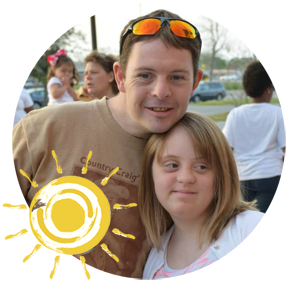Children with Down syndrome face the same medical challenges that children in the rest of the population face…just at a slightly higher frequency. Those challenges are further complicated by issues our children face just by having Down syndrome.
 This web page is designed to help parents make informed decisions about the medical care for their children, including those with Down syndrome. Here, You’ll find information on a wide array of medical topics that may apply to people with Down syndrome. We will continue to build this page as news of new medical advancements is available. Our goal is to provide you with the most current information possible on such topics as heart disease, atlantoaxial instability, Alzeheimer’s disease, Celiac disease and much more.
This web page is designed to help parents make informed decisions about the medical care for their children, including those with Down syndrome. Here, You’ll find information on a wide array of medical topics that may apply to people with Down syndrome. We will continue to build this page as news of new medical advancements is available. Our goal is to provide you with the most current information possible on such topics as heart disease, atlantoaxial instability, Alzeheimer’s disease, Celiac disease and much more.
Our links page here will take you to recommended reading, books and the web sites of area medical hospitals, clinics and therapy centers that treat people with Down syndrome.
The information on these pages is meant to inform, but not to replace the advice of qualified medical professionals. It should be used to form a basis of understanding of these medical conditions and a springboard from which you can talk to your doctor about these issues, how they affect your child and what course of treatment is best for him or her.
The Arc / The Arc of Greater New Orleans/ Goodwill Industries of South East Louisiana
Independence and the desire for it are things we can all relate to. Independence is something we all strive for, so why should it be any different for someone who’s disabled? Making decisions for yourself based on who you are and what you want out of life is a basic necessity of all human beings for living a full and meaningful life. On these links, read about independence and self-determination, information about transitioning to adult life from experts, self-advocates and parents and find links to independent living facilities and agencies that assist people to live independently.
Increasing Workplace Independence for People with Cognitive Disabilities by Leveraging Distributed Cognition Among Caregivers and Clients
Easter Seals
The Arc
The Arc of Greater New Orleans
United Cerebral Palsy
Goodwill Industries International
Goodwill Industries of South East Louisiana
Steps to Independence: Teaching Everyday Skills to Children with Special Needs, Fourth Edition
By Bruce L. Baker, Ph.D., & Alan J. Brightman, Ph.D., with Jan B. Blacher, Ph.D., Louis J. Heifetz, Ph.D., Stephen R. Hinshaw, Ph.D., & Diane M. Murphy, R.N. – Brookes Publishing.
Parents are their children’s first and most influential teachers. That’s an important job — and this popular, highly respected guidebook makes it much easier. Already a trusted resource for thousands of families, this lively book gives parents of children from age 3 through young adulthood proven strategies for teaching children the life skills they’ll need to live as independently as possible. Parents will start with a reader-friendly overview of the basics of teaching and then go deeper with a step-by-step guide to teaching seven different types of skills: get-ready, self-help, toilet training, play, self-care, home-care, and information gathering skills. In this fourth edition, they’ll also find helpful updates and additions, such as managing behavior problems, including guidance on identifying the problems, examining behavior, initiating a behavior management program, and encouraging alternative behaviors; technology; strengthening partnerships with other teachers in the child’s life during IEP meetings, through classroom volunteer work, and in everyday communication with them;a companion website with downloadable blank forms from the book and more Internet resources, such as links to useful web pages; Based on years of work with parents and laced with humor, helpful illustrations, and vignettes, this is a must-have resource for families and all professionals who work with them.
$29.95
ISBN 1-55766-697-0
Retarded Isn’t Stupid, Mom! Revised Edition
By Sandra Z. Kaufman – Brookes Publishing
Nicole is 2 years old, and her family, after months of worrying, has just learned she has mental retardation. In a fast-paced, engaging story, mother Sandra Kaufman frankly reveals the feelings of denial, guilt, frustration, and eventual acceptance that result in a determination to help her child live an independent life. This edition, revised on the 10th anniversary of the book’s original publication, adds a “progress report” that updates readers on Nicole’s adult years and reflects on the revolutionary changes in society’s attitudes toward people with disabilities since Nicole’s birth. Retarded Isn’t Stupid, Mom! remains a celebration of all that a child can grow to be.
$22.95
ISBN 1-55766-378-5
Self-determination offers people with disabilities greater access to the things that will give their lives meaning and fulfillment, and thus, enhances their independence because independence isn’t necessarily just about living alone, but about making our own choices to determine the course of our lives. On these links, read about independence and self-determination, information about transitioning to adult life from experts, self-advocates and parents and find links to independent living facilities and agencies that assist people to live independently.
NPR All Things Considered: Self-Determination At Work
SABE (Self-Advocates Becoming Empowered)
Teaching Self-Determination to Students with Disabilities Basic Skills for Successful Transition
By Michael L. Wehmeyer, Ph.D., Martin Agran, Ph.D., & Carolyn Hughes, Ph.D.
Too many students with disabilities leave school ill-prepared for adulthood. To teach them the specific skills they need for a more satisfactory, self-directed life, educators can turn to this teacher-friendly resource. In it they’ll find not one generalized approach, but many ready-to-use practices for teaching the skills related to autonomy, self-regulation, self-advocacy, and self-realization. There are tips on what instructional strategies and materials to use and how best to work with students. Listed objectives and key terms at the beginning of each chapter allow for at-a-glance review and easy access to information. Vignettes and case studies sprinkled throughout the text demonstrate how to anticipate and resolve a range of problems. Practicing and prospective teachers will find this book to be a useful tool for meeting IDEA requirements while motivating high school students with disabilities to prepare for successful transitions to adulthood. ISBN 1-55766-302-5 $34.95 Brookes Publishing
